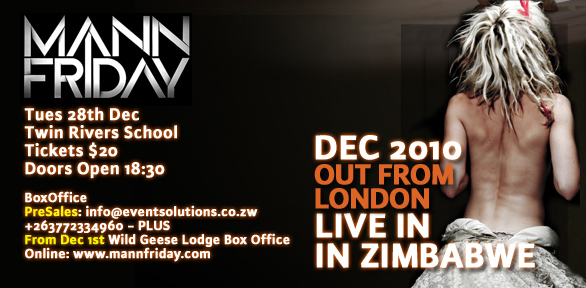Mass Uprising: The Only Way to Transfer Power in Zimbabwe
Thursday, November 18th, 2010 by Bev ClarkPromise Mkwananzi suggests that massive protests by Zimbabweans will be the only way to get rid of the Mugabe regime. In his article below he appeals to the MDC to restore and strengthen their support with “grass roots oriented” organisations like ZINASU, the NCA and the ZCTU. Of course it’s questionable how much of a real constituency any of these NGOs actually has. But recently at the Progress in Zimbabwe conference held in Bulawayo, social and political commentator John Makumbe said that dictators do not hand over power through democratic means. Listen to John here, and read more of Promise below:
ZANU PF has repeated its mantra that they will not allow MDC-T to rule the country. The seriousness of their utterances can only be ignored at one`s own peril. This is exacerbated by an even more worrying development of declaring Robert Mugabe President for life. These are no illusionary rumbles, ZANU PF means it. This makes it clear that whatever reforms, if any, will be reached, the election will simply be another terrific war. Despite that, MDC will win that election because ZANU PF has no more support base whatsoever. Thus, in my view, you could for example repeal POSA, AIPPA etc but still retain the same undesirable conditions which they created, or even worse. This is because ZANU PF is not going to adhere to the normative legal/political/constitutional/ frameworks. They are just going to bar MDC rallies without any pretence of any sort of legal basis. They will either simply say you cannot meet or just send police and militia to come and beat the hell out of you, without having to explain anything. If they do this once or twice, you will be sure that MDC rallies will be a no-go area. ZANU PF will simply ignore international condemnation from the West while SADC/AU will just watch and declare the elections as unfair but still recognize Mugabe as President. They might even suggest fresh negotiations aimed at another GNU with ZANU PF in charge. Nevertheless, in a secret ballot, the MDC will and can still win the elections. In this dramatic scenario, I am trying to illustrate how much it will not be enough to simply rely on the normative democratic institutions alone. From the look of things, winning an election will not enough for one to govern. However elections provide a very good basis to launch a mass uprising against Mugabe and drive him out of office for good. This is especially so if Mugabe would, despite his violent campaign still lose the election dismally.
This by the way is a very likely scenario. The first round of elections in 2008 provides a perspective. Soon after the election counting was done and rumors began to filter that the MDC had won the election. Impeccable sources have it on record that many in ZANU PF were preparing to flee. However, because the MDC still believed so much in the goodness of ZANU PF they helped calm the people by urging them to be patient until the results were officially announced. One might argue that this was a strategy to ensure that there is no chaos, which could provide ZANU PF with an excuse to declare state of emergency and suspend the results altogether. On hindsight, the calmness did not work in favor of the MDC. In fact, it allowed ZANU PF time to recuperate, re-strategize and launch a massive come back. ZANU PF went ahead to operate a de-facto state of emergency, leading to a violent June sham. We all know what happened. In 2002, again the MDC restrained its supporters, urged calm and hoped that Chidyausiku would nullify Mugabe`s victory. Of course Chidyausiku did not and will not that.
That is the premise of my argument: that under an authoritarian regime; you cannot rely on normative institutions alone. There is need for that extra push to be provided by the masses. The big question of course is whether the people are ready for such a costly enterprise, and my answer is yes, why not. The leadership must mobilize conscientize and prepare the people for this. There is no alternative to this. This would include mass protests such as stay aways, boycotts, demonstrations etc-compounded with the election defeat; such a situation will put Mugabe regime in a weaker position and will provide the international community with enough bases to pressure Mugabe to step down. It is also my contention that the rank and file of our coercive state machinery is sick and tired and want change. However, before the civilians can shake the corridors of ZANU PF rule, they remain limited in what they can do. That is why it has become so imperative for the MDC to restore its relations with its grass roots oriented alliances such as ZINASU, NCA, ZCTU and others who will be very crucial in this seemingly impossible task. There is need for further deliberative engagement!










